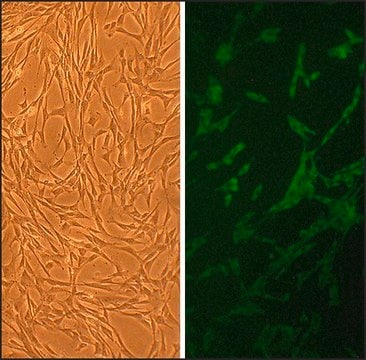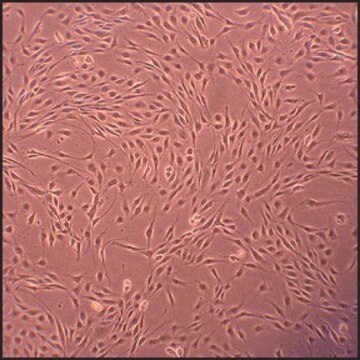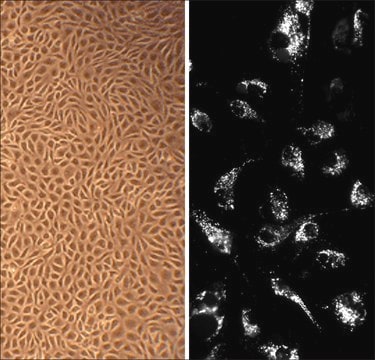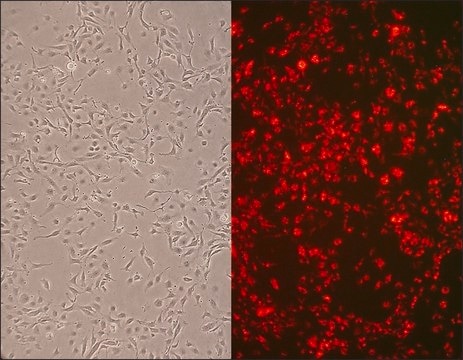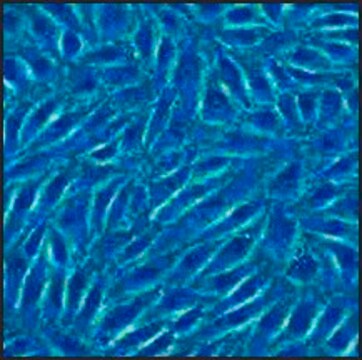CN354-05
Canine Aortic Smooth Muscle Cells: CnAOSMC (Cryovial)
Přihlásitk zobrazení cen stanovených pro organizaci a smluvních cen
About This Item
UNSPSC Code:
41106514
NACRES:
NA.81
Doporučené produkty
biological source
canine aorta (normal, tunica intima and media)
packaging
pkg of 500,000 cells
manufacturer/tradename
Cell Applications, Inc
growth mode
Adherent
karyotype
2n = 78
morphology
smooth muscle
technique(s)
cell culture | mammalian: suitable
relevant disease(s)
cardiovascular diseases
shipped in
dry ice
storage temp.
−196°C
General description
Lot specific orders are not able to be placed through the web. Contact your local sales rep for more details.
Canine Aortic Smooth Muscle Cells (CnAOSMC) are derived from tunica intima and tunica media of normal canine aorta. They are cryopreserved at second passage and can be cultured and propagated at least 10 population doublings. Platelet-derived growth factor (PDGF) is a potent mitogen and chemotactic agent which may be involved in intimal hyperplasia and atherosclerosis. It was shown that significant regional difference in PDGF production in normal canine aorta, and that SMC are a significant contributor to the regional variation in PDGF production.
1. It was also shown that nebivolol relaxes vascular smooth muscle by NO- and cyclic GMP-dependent mechanisms.
2. Graft SMCs are functionally altered producing more platelet-derived growth factor (PDGF) than aortic SMCs. PDGF produced by graft SMCs may contribute to the development of intimal hyperplasia.
3. Graft SMCs have decreased proliferation response, but have similar migratory response to PDGF compared with aortic SMCs.
4. Intrinsic differences in endothelial cells from proximal aorta versus the distal aorta have different capacity to produce PDGF in response to stimulants whereas unstimulated SMCs did not exhibit regional variation in PDGF production and did not increase PDGF secretion after PMA or thrombin treatment.
5. Identification of the cDNA for canine isoform of nitric oxide synthase (iNOS) can be used in the study of allograft rejection and cardiovascular disease.
RECENT PUBLICATIONS Kiyan, Y., S. Tkachuk, D. Hilfker-Kleiner, H. Haller, B. Fuhrman, and Inna Dumler. 2014. oxLDL induces inflammatory responses in vascular smooth muscle cells via urokinase receptor association with CD36 and TLR4. J Molec and Cell Cardiol, 66:72-82.
Ignarro, L.J. et al, Nitric Oxide. 7(2):75-82 (2002).
Madura, J.A. et al, J. Vas Res. 33(1):53-61 (1996).
Pitsch, R.J. et al, J. Vasc. Surg. 26(1):70-8 (1997).
Minion, D.J. et al, J. Vasc. Surg. 31(5):953-9 (2000).
Van Aalst, J.A. et al, J. Vasc. Surg. 32(3):584-92 (2000).
Wang, X. et al, Am. J. Physiol. 275(4 Pt 2):H1122-9 (1998).
Products are for research use only. They are not intended for human, animal, or diagnostic applications.
Canine Aortic Smooth Muscle Cells (CnAOSMC) are derived from tunica intima and tunica media of normal canine aorta. They are cryopreserved at second passage and can be cultured and propagated at least 10 population doublings. Platelet-derived growth factor (PDGF) is a potent mitogen and chemotactic agent which may be involved in intimal hyperplasia and atherosclerosis. It was shown that significant regional difference in PDGF production in normal canine aorta, and that SMC are a significant contributor to the regional variation in PDGF production.
1. It was also shown that nebivolol relaxes vascular smooth muscle by NO- and cyclic GMP-dependent mechanisms.
2. Graft SMCs are functionally altered producing more platelet-derived growth factor (PDGF) than aortic SMCs. PDGF produced by graft SMCs may contribute to the development of intimal hyperplasia.
3. Graft SMCs have decreased proliferation response, but have similar migratory response to PDGF compared with aortic SMCs.
4. Intrinsic differences in endothelial cells from proximal aorta versus the distal aorta have different capacity to produce PDGF in response to stimulants whereas unstimulated SMCs did not exhibit regional variation in PDGF production and did not increase PDGF secretion after PMA or thrombin treatment.
5. Identification of the cDNA for canine isoform of nitric oxide synthase (iNOS) can be used in the study of allograft rejection and cardiovascular disease.
RECENT PUBLICATIONS Kiyan, Y., S. Tkachuk, D. Hilfker-Kleiner, H. Haller, B. Fuhrman, and Inna Dumler. 2014. oxLDL induces inflammatory responses in vascular smooth muscle cells via urokinase receptor association with CD36 and TLR4. J Molec and Cell Cardiol, 66:72-82.
Ignarro, L.J. et al, Nitric Oxide. 7(2):75-82 (2002).
Madura, J.A. et al, J. Vas Res. 33(1):53-61 (1996).
Pitsch, R.J. et al, J. Vasc. Surg. 26(1):70-8 (1997).
Minion, D.J. et al, J. Vasc. Surg. 31(5):953-9 (2000).
Van Aalst, J.A. et al, J. Vasc. Surg. 32(3):584-92 (2000).
Wang, X. et al, Am. J. Physiol. 275(4 Pt 2):H1122-9 (1998).
Products are for research use only. They are not intended for human, animal, or diagnostic applications.
Cell Line Origin
Aorta
Application
aortic wall contraction, role of smc under normal conditions, blood pressure, distribution of oxygenated blood through systemic circulation
Components
Canine Smooth Muscle Cell Basal Medium containing 10% FBS & 10% DMSO
Preparation Note
- 2nd passage, >500,000 cells in Canine Smooth Muscle Cell Basal Medium containing 10% FBS & 10% DMSO
- Can be cultured at least 10 doublings
Subculture Routine
Please refer to the CnAOSMC Culture Protocol.
Storage Class
11 - Combustible Solids
wgk_germany
WGK 3
flash_point_f
Not applicable
flash_point_c
Not applicable
Vyberte jednu z posledních verzí:
Osvědčení o analýze (COA)
Lot/Batch Number
Je nám líto, ale pro tento produkt momentálně nemáme COA k dispozici online.
Potřebujete-li pomoc, obraťte se na Zákaznická podpora
Již tento produkt vlastníte?
Dokumenty související s produkty, které jste v minulosti zakoupili, byly za účelem usnadnění shromážděny ve vaší Knihovně dokumentů.
Náš tým vědeckých pracovníků má zkušenosti ve všech oblastech výzkumu, včetně přírodních věd, materiálových věd, chemické syntézy, chromatografie, analytiky a mnoha dalších..
Obraťte se na technický servis.